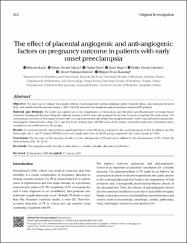The effect of placental angiogenic and anti-angiogenic factors on pregnancy outcome in patients with early onset preeclampsia

Göster/
Erişim
info:eu-repo/semantics/openAccessTarih
2021Yazar
Kara, MustafaYalvaç, Ethem Serdar
Onat, Taylan
Başer, Emre
Çaltekin, Melike Demir
Kırmızı, Demet Aydoğan
Karadağ, Müjgan Ercan
Üst veri
Tüm öğe kaydını gösterKünye
Kara, M., Yalvaç, E. S., Onat, T., Başer, E., Çaltekin, M. D., Kırmızı, D. A., & Karadağ, M. E. (2021). The effect of placental angiogenic and anti-angiogenic factors on pregnancy outcome in patients with early onset preeclampsia. Journal of the Turkish German Gynecological Association, 22(3), 212.Özet
Objective: The aim was to evaluate the possible effects of anti-angiogenic factors including soluble endoglin (sEng), placental growth factor (Pgf), and soluble fms-like tyrosine kinase 1 (sFlt-1) in both normotensive pregnant patients and preeclampsia (PE) patients. Material and Methods: The study was carried out at the Departments of Gynecology and Obstetrics and Biochemistry of Yozgat Bozok University Training and Research Hospital. Eighteen women with PE who were pregnant for at least 20 weeks comprised the study group. The control group consisted of 33 pregnant women with no complications and with similar demographic features. In the study, laboratory parameters, demographic characteristics, sEng, sFlt-1, and Pgf levels, delivery type, APGAR scores of the infants, and birthweight were determined and a comparison was made between the groups. Results: It was found that the sEng level was significantly lower in the PE group compared to the control group (p<0.05). In addition, the Pgf, birthweight, and 1st and 5th-minute APGAR scores were significantly lower in the PE group compared to the control group (p[removed]
Kaynak
Journal of the Turkish German Gynecology AssociationCilt
22Sayı
3Bağlantı
https://doi.org/10.4274/jtgga.galenos.2021.2020.0173https://hdl.handle.net/20.500.12513/5165

















